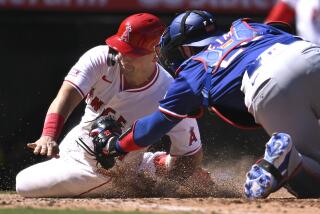Pitching Woes Mount for Rangers
ARLINGTON, Tex. — The basketball coach who recently packed up and vacated Reunion Arena used to cringe when anyone suggested that his team was pretty good.
Overconfidence, Dick Motta felt, was immeasurably worse than a wasp sting and he was shown to be quite right on that subject during this year’s NBA playoffs.
The people who run the show at Arlington Stadium, meanwhile, have proven to be just the opposite.
During the days leading up to the 1987 baseball season they were happy to hear about it when others suggested that the Texas Rangers were the team to beat in the American League West.
The Rangers, after all, were baseball’s most improved team in 1986 and the reasoning among the fans was that they were pennant bound. At some point along the way, however, Texas manager Bobby Valentine should have exhibited some of Dick Motta’s natural reluctance.
Someone might have stood up and said, “Well, this team might score runs, but the pitching is still awful young and perhaps we shouldn’t be predicting greatness for this bunch until it actually happens.”
But nobody did. The anticipation built and the excitement grew and now the emotions are flat.
The Rangers will win the American League West only if they average 10 runs a game. And even that might not do it.
Texas’ young pitching staff is in tatters and as a result the Rangers find themselves fighting to stay out of last place rather than battling to get into first.
“The guys are putting in a lot of effort,” said Texas pitching coach Tom House, “and they aren’t getting results. I feel for them.”
One after another, Texas pitchers have gone into miserable slumps.
Reliever Greg Harris threw away a pickoff attempt on opening day, costing Texas the game. Then things got worse.
Fastballer Bobby Witt, 23, experienced continuing control problems and then on a night when he pitched about as well as he has all year he hurt his shoulder and went on the disabled list.
Edwin Correa, 21, had one bad outing after another and was dispatched to the bullpen.
Jose Guzman, 24, began leaving ball games earlier and earlier.
Reliever Mike Mason was ineffective, couldn’t get along with Valentine, and was dealt away to the Chicago Cubs.
Even old, reliable Charlie Hough has not been immune, suffering through a bad outing June 2 that led to a 15-5 thrashing at the hands of the Chicago White Sox.
Most of Texas’ victories have been come-from-behind affairs, including a series of bizarre late-inning rallies from sizable deficits. Those kind of wins, however, do not bring pennants.
During a 24-game stretch ending June 2, the Rangers staff allowed 46 homers--almost two a game. For three weeks, the staff ERA had been right at 10 runs a contest.
Texas got 15 hits in one game and still lost.
“We get all those hits and still can’t win,” said Valentine. “Games like that are tough. But one thing about a nightmare. Sooner or later you wake up.”
The Rangers have become so desparate for pitching, they called up Bob Malloy from Class A Gastonia. In his first 11 innings of work he gave up 13 hits.
Through it all, House has tried to keep his sense of humor.
“All of those shots (home runs) remind me of my golf game,” he said. “There are enough good ones to make we want to come back the next day.
“The guys are trying and we’ll keep working. I know I can be a good pitching coach with a good staff. Now I have to try to be a good coach when the staff isn’t going so good.”
The trouble is that since eight members of that staff had no more than a year’s major league experience when the season began, there was no solid reason to expect it to be very good. A lot of people did, though, and they have come to be very disappointed.
More to Read
Go beyond the scoreboard
Get the latest on L.A.'s teams in the daily Sports Report newsletter.
You may occasionally receive promotional content from the Los Angeles Times.










